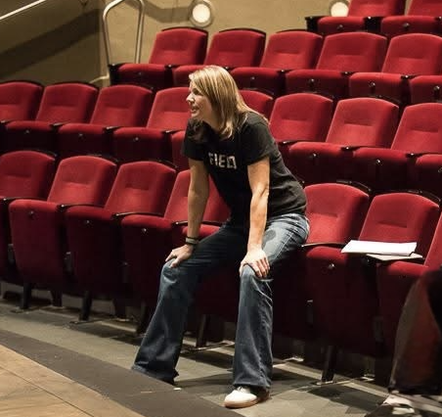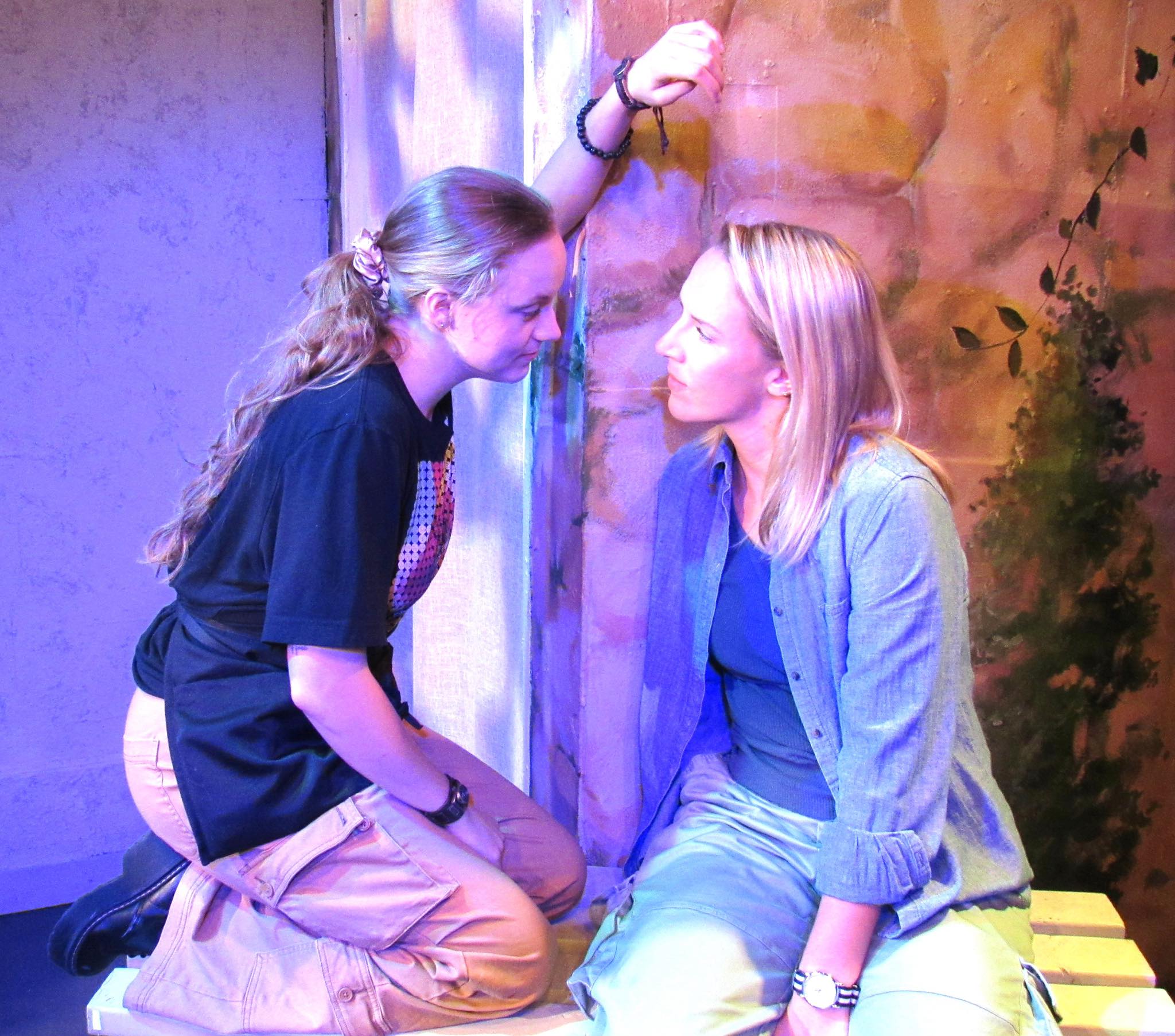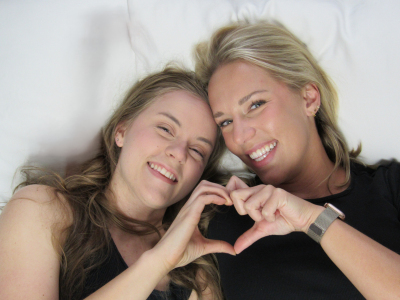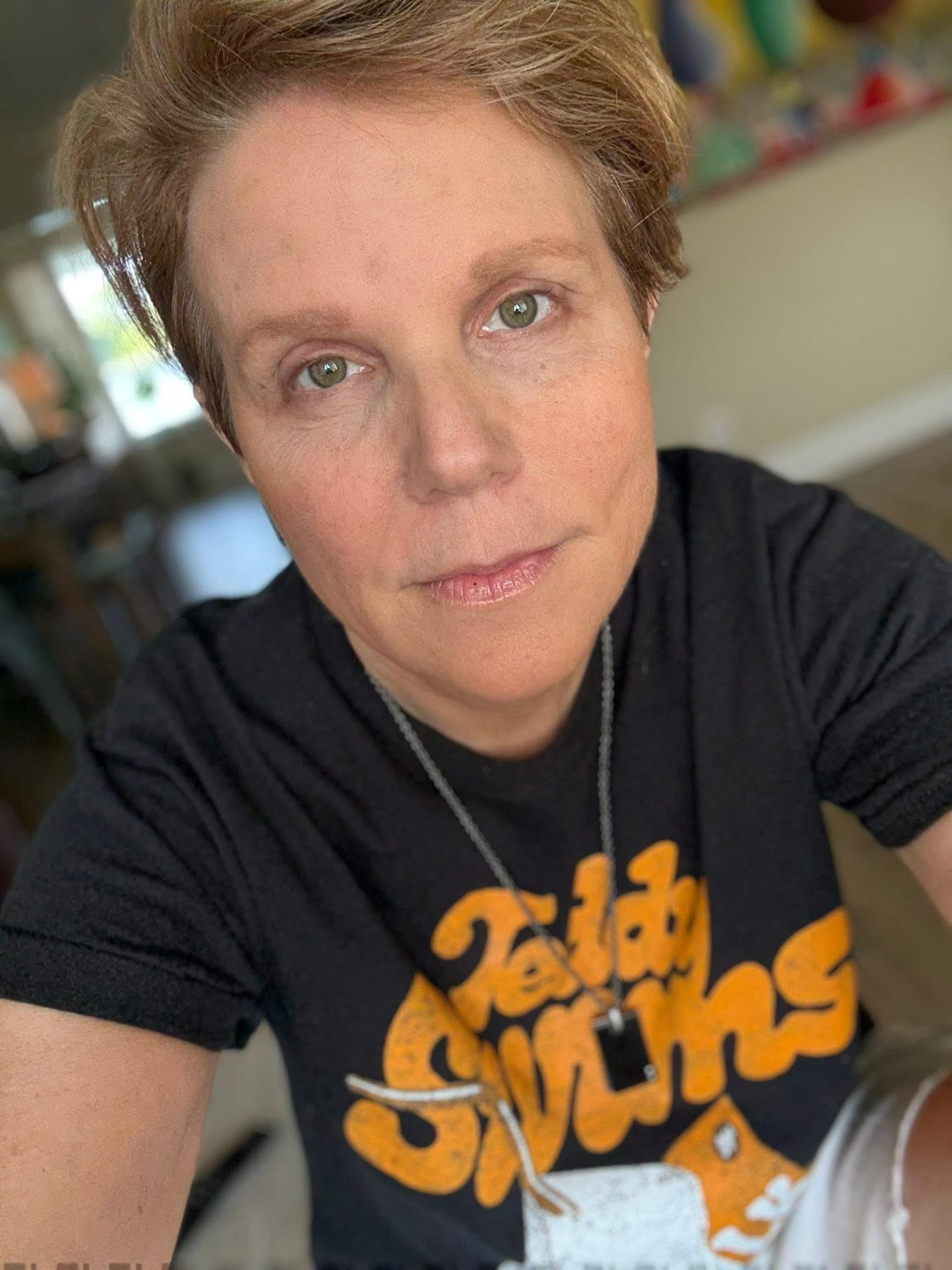Call Redialed: NEW Kim Ehly Interview: Spy For Spy - A Return To Their Theatrical Roots
Jul 23, 2025
August 2025 Update:
Kutumba Theatre Project's production of Kieron Barry's Spy For Spy is going on the road! They will be playing TWO PERFORMANCES ONLY in Asheville, NC at The BeBe Theatre on September 12 & 13. Click here for tickets!
Original July 2025 Interview:
I am so excited to be catching up with Writer, Director & Actor Kim Ehly, whom I last spoke to 11 years ago, when Kim's show Baby GirL played the International Fringe Festival in New York City.
Since that time, Kim has become a licensed psychotherapist and established a private practice.
Now, Kim is now returning to their theatrical roots to direct Kieron Barry's Spy For Spy at their theatre company, Kutumba Theatre Project in South Florida.
In this NEW interview, Kim once again answered my call, but this time around they share:
- Why Spy For Spy was THE SHOW that made Kim come out of theatrical hibernation
- What made Kim want to direct this show
- How they tackled this complex story and the way it's being told
- What Kim gets from the combination of both theatre and being a therapist
- So much more
Connect with Kim: Kutumba Theatre Project
Written by Kieron Barry, Spy For Spy is a playful, sophisticated, funny & heartfelt story that follows the relationship between two Californians, Molly & Sarah, who couldn’t be more different. The play opens with a prologue & closes with an epilogue, with six scenes in between, which are shuffled for each performance. Audience members select from 6 unidentified CDs to determine the order of the play for the following night. Similar to our memories, they can be jumbled & no matter how they’re put together, they make sense. The play is cleverly crafted, so that the story is the same every night no matter what the order. There are 720 versions of the same play & every night is a different ride.
Spy For Spy runs through August 3, 2025 at Empire Stage in Ft. Lauderdale, FL.

1. Performances just started at your theatre company in South Florida, Kutumba Theatre Project, for Kieron Barry's Spy For Spy. This is the theatre company's first play in several years. What made now the right time to "come out" of hibernation? The right script at the right time. It sounds simple, but the truth is, I was waiting for the right script to come along that jumped out at me and Spy for Spy is that script.
I also want to tell stories of the underserved within the LGBTQ+ community and Spy for Spy does that for bisexual and lesbian women through this Sapphic love story. I will add, in this political climate, I feel inspired to make LGBTQ+ works as visible as possible.
2. In addition to being the Artistic Director for Kutumba Theatre Project, you are also directing Spy For Spy. What made you want to direct this show & help tell its story? The concept of shuffling the 6 songs/scenes at the heart of the play drew me in because it isn’t just some gimmick. It’s a study in the way we remember past relationships, which is rarely linear. The challenge of directing two actors and preparing them to understand the arc of a play that is shuffled every night called to me. It’s clever, witty, profound and poignant all at once.
It’s a genuine exploration into what real love is and how it shows up in our lives. Kieron’s writing is a gift as is his collaborative and supportive spirit. We are very similar in our approach. That was an unexpected enhancement to the process.
 Kim Ehly Directing
Kim Ehly Directing
3. For those of us that don't know the process, can you explain the process in how you get to become the director for a theatrical show? I think the way to becoming a director varies by person. For me, it was built on two decades in the theatre. It was a natural transition for me to make. I love the process of theatre. It’s a metaphor for life.
I’m very process oriented and love to be collaborative. That comes from being an actor who works from the inside out. Honesty and openness are the keys to being a good actor and the same goes for directors.
I do have a Bachelor in Fine Arts, Acting and Directing, but my skills come from my experience over two decades. I understand people. I care about people. I think being a therapist has given me even more insight into directing.
4. Spy for Spy is a very unique show because, while the beginning and ending are the same every night, audience members select from 6 unidentified CDs to determine the order of the play for the following night. How does the show tell the same story if the order is different every night? It’s interesting. Although the show remains the same, the experience is very different depending on the order. The audience who has a more poignant, serious, sad scene at the end tends to leave feeling moved, whereas an audience who saw the order with a more playful, witty scene at the end tend to leave with more of a buoyant demeanor.
At one point in the play, Molly, a character in the play, refers to something her friend said in acting class, “final scene happy equals comedy, final sad equals tragedy.” The play is laced with references to things like this, when in a break up scene, Sarah says something like “we never got our happy ending” and Molly replies “maybe we did, maybe it just came in the middle.” This message is one of those at the heart of the play.
 Left to Right:
Left to Right:
Abbie Fricke (as Molly) & Taylor Lyn Dawson (as Sarah)
Kieron Barry's Spy For Spy
5. As a director, how do you prepare your cast for this kind of production? From day one, even though I knew there would be challenges, I let them know “when we open, we will be ready for an audience.” How did I do that? Built the play and our understanding of the play bit by bit with each song/scene as its own story. When we shuffled it the first time about a week before we opened, it was like magic, and the actors never missed a beat.
The brilliance of this play is that there is no exposition, so to speak. The clues are scattered throughout and no matter the order, it always makes sense. For practical reasons, I put the actors in cargo pants, because lesbians love cargo pants…and so that essential personal props are there on their person, at all times.
Before each show, the actors arrive and find out the shuffle that the audience the night prior pulled, then we do a transitions call, so that they know where they’re going and when. It’s similar to a fight call before a show. It helps get the transitions between songs into their muscle memory.
6. What are some challenges you faced directing this show? Sometimes a show is like a dream and things simply fall into place and I’d say this play is one of them. That has to do with choosing the right cast and the right crew and the professionalism that everyone has been bringing to this project. All of those aspects fell into place. The challenges were the unknowns. How do you direct a play that will be shuffled? I had to keep the jumbled order in mind at all times from day one. I had to watch the scene or play as if it was the first time, every time.
For example, pacing a play that can start anywhere means the pace and intention must be considered all the way through. The production in London had very long scene changes. I knew ours needed to be less than 20 seconds and they are. It keeps the momentum. That is intentional. All of this had to be well thought out, so I’d say, projecting confidence and at the same time, not knowing the answers and being able to say that, were the strengths of my approach. I’m unafraid to say, “hmm, how are we going to make that work?” Not knowing helps. Trusting the process helps. The final product is truly like magic.
7. Which parts of the show did you instantly know how you wanted them to be staged? Bringing lived experience as a person in the LGBTQ+ community meant that I knew I wanted Sarah and Molly to develop a clear history and feel that in the evolution of the intimacy expressed from song to song, keeping in mind that it wouldn’t be chronological.
By intimacy, I mean the way they physically relate and express themselves to one another. So in the first song which might be last, their physicality is very different than in the third song or the sixth song. That evolution is beautiful to watch in a jumbled order and tells the story even without the words, without the dialogue. I knew I wanted that.
 Left to Right: Abbie Fricke & Taylor Lyn Dawson
Left to Right: Abbie Fricke & Taylor Lyn Dawson
Stars of Spy For Spy
8. The last time we did an interview together was in 2014 when your play Baby GirL was in the NYC Fringe Festival. Since that time, you have taken a break from theatre to become a psychotherapist . What made you want to switch careers? I would say, I made room for another passion rather than switching careers. At the time you and I first interviewed, I was about to enter the last semester of my Master of Social Work. When Baby GirL made its debut in 2012, I didn’t quite fully grasp that I was a writer and a director. I just followed my strong desire to tell that story. So I guess you could say I stumbled upon two passions that people who know me, define me as, a writer and director. And I define myself that way, also.
When I graduated high school, I wanted to be an actor or a therapist. I got a scholarship for acting and that made up my mind. I’d say I didn’t switch careers. I simply put one on hold while I established the other. Now that my practice is thriving, I can return to my passion of writing and directing. I think I’m a better director for having built a private practice as a therapist. I have better insight into the work, the impact that work can have on everyone involved. I believe theatre can be a rich, healing environment.
Actors, when they’re at their best, are vulnerable. Their instrument is themselves. They offer vulnerability and I take that seriously. I want the people involved with productions at Kutumba to experience a collaborative, secure, even healing environment, and to enjoy lots of laughter with humans, who care about humans. Empathy is at the heart of my work, stouthearted empathy.
9. What made Spy For Spy be the show for you to make you return to your theatrical roots? I think it’s because of the timing. I had planned to return in 2020, but hadn’t landed on the material to direct, and then the pandemic hit, so I paused that plan, then I was in a transatlantic relationship with someone in England, and enjoyed seeing lots of theatre in London. I saw Spy for Spy over the summer of 2023.
After I saw it, I thought, “I’d like to direct that play.” This isn’t a usual thought. I generally don’t want to see a play that I’m going to direct. The reason Spy for Spy is an exception is the shuffled aspect and the lived experience I bring to it. In February this year, I wrote my first email to Kieron Barry to obtain the rights and things took off from there.
I feel honored that he allowed me to direct the East Coast Premiere of his play. Here’s some “Breaking News,” Kieron Barry, the playwright will be “popping over” to see our production the last weekend of our run, August 1 and 2 and I couldn’t be more pleased. Kieron, the cast, and I will be doing Q and A’s after those shows.
10. What have you gotten from being a psychotherapist that you were not getting from theatre? I think it’s not separate but rather together. I bring a lot of skills from my background in theatre to my work as a therapist and vice versa. Empathy, honesty, openness, vulnerability, collaboration, insight, humanity. These are all qualities that make both being a therapist and being in the theatre uniquely profound.
Being a therapist is a private exchange and deeply meaningful and impactful work. Being a director, writer, producer is a very public exchange and deeply meaningful and impactful work. My aim is to inspire, encourage, and empower the awakening of the human spirit with the gift of my voice and the voice of my actions. Most of my focus in both fields is the LGBTQ+ community.
11. What is something we didn't get to talk about in this interview that you'd like my audience to know about you? Through my work as a therapist with trans people, I would often refer to gender as a spectrum and expressed that I, myself, fall somewhere in the middle. In fact, I referred to this in the “playwright notes” section at the beginning of my play, Baby GirL, when it was conceived years ago.
I just didn’t have the language that we do now, so for the sake of this interview, I’d like to let you and your readers know that I’m non-binary and my pronouns are they/them. Thank you for giving me, and so many others, a place to share our thoughts.
More Kim Ehly Interviews:
2014 (Read Here): Baby GirL at the NYC Fringe Festival
 Kim Ehly
Kim Ehly
More on Kim Ehly:
Kim Ehly, directed the NYC Premiere of a sold out run of Kim’s hit play, Baby GirL, at The New York International Fringe Festival-FringeNYC for Kutumba Theatre Project. Chosen from thousands of scripts, Baby GirL, played at the Kraine Theatre. Kim is a veteran of the theatre and has worked in film, TV, theatre, commercials and voice overs in NYC, LA, and South Florida. Kim directed Julie Johnson and The Beebo Brinker Chronicles, two of Kutumba’s smash hits.
Kim wrote and directed their debut play, Baby GirL, as the inaugural production of the non-profit, Kutumba Theatre Project. Baby GirL enjoyed sold out audiences and critical acclaim. As a result of that production, Kim was the first female/non-binary playwright to receive the SILVER PALM AWARD for Outstanding New Playwright and was nominated for a Carbonell Award and a Broadway World Award for Best New Play. Kim’s play under their direction, also received the honor of being named in the Top Five Plays by the Sun Sentinel, Top Ten in the Miami Herald, and Best Debut by Florida Theatre On Stage. The screenplay version of Baby GirL, which has not yet been produced, placed as a finalist in the NewFest Film Festival in NYC.
Kim has a BFA in acting/directing from FAU. Kim directed two shorts for an LGBT short play series (SILVER PALM AWARD). Kim wrote a short for that project called The Happy Ones. That short was selected to be part of Girl Play at The Women’s Theatre Project and was voted Audience Favorite/Best of the Fest. Kim was commissioned to write two, one-minute plays, “T” and Places, which premiered at this year’s One Minute Play Festival in Miami. Kim has directed for The Women’s Theatre Project, The New Theatre, City Theatre, Naked Stage, Island City Stage, Michael Howard Studios, among other professional theatres in South Florida and in NYC.
Kim was also named one of 9 most intriguing people in the arts community of South Florida and one of 50 most influential people in the LGBT community of South Florida by the SFGN (South Florida Gay News). The Miami Herald named Kim among the "Power Players" of Women in the Arts. Kim is a proud member of The Dramatists Guild of America, and is a longtime member of Actors' Equity Association and SAG/AFTRA.


